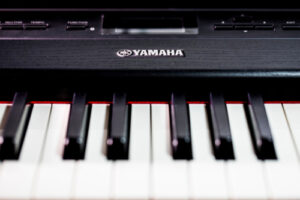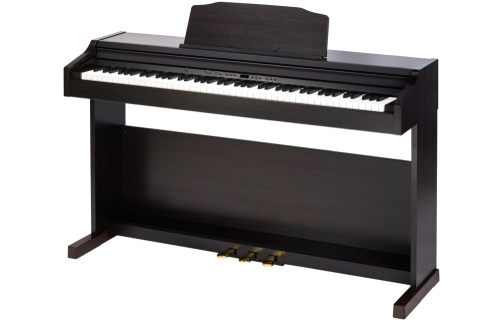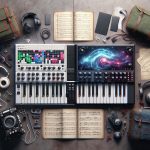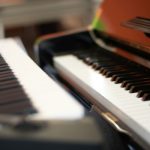Difference between digital piano and keyboard
If you're looking to buy an instrument to start your musical journey, you may wonder about the difference between digital pianos and keyboards. Both are popular for beginners and experienced musicians, but some key distinctions exist.
In this article, you don't have to worry about it because we will help you understand the difference between a digital piano and a keyboard.
Also, This blog post will explore the main distinctions between digital pianos and keyboards to help you choose the right instrument.
People use the terms digital piano and electronic keyboard to describe a wide variety of instruments, like console digital pianos or synths. We will focus on each term's most common definition and usage to make things less confusing.
So without further ado, let's dive into it.
What is a digital piano?
Digital pianos are meant to seem like real pianos. Digital pianos generally include 88 keys and resemble acoustic pianos. They are usually offered in three configurations: upright, in a cabinet, or on a keyboard stand. A digital piano is often comparable to an acoustic piano in terms of touch, feel, and sound.
There are several distinctions between digital pianos also, Standard digital pianos, upright digital pianos, and stage pianos are the three most common types of digital pianos. Upright vertical pianos have a large cabinet comparable to an upright piano.
A digital piano is often equipped with the best hammer action key systems and tone generation engines to match it to the performance of a traditional upright piano.
Now let's take a look at keyboards.
What is a keyboard?
A keyboard is a musical instrument that is played using a piano-style keyboard. A keyboard typically has 61 or 76 keys, although some professional models have 88 keys.
Keyboards usually have weighted or semi-weighted keys, which means that the keys respond to your touch in a way that makes it feel like you are playing a real piano.
In addition, keyboards usually have more sounds than digital pianos, which makes them more versatile instruments.
Now that we know the primary distinction between digital piano and keyboard let's go more in-depth and explore the difference between them.

Yamaha Keyboards Are Extremely Popular
Digital piano vs keyboard
Digital pianos and keyboards are often used interchangeably, but there are some critical differences between the two. For one, digital pianos tend to be more expensive than keyboards because digital pianos typically offer more features and better sound quality.
Another difference is that digital pianos usually have weighted keys, which makes them feel more like acoustic pianos.
This is a significant selling point for many piano players. Finally, digital pianos typically have more realistic pedal functions, making them feel more like acoustic pianos.
So, a digital piano is probably a better choice if you're looking for a more authentic piano experience. But a keyboard might be the way to go if you're on a budget or want something lighter and easier to carry.
Number of keys
The number of keys on a digital piano corresponds with the number on an acoustic piano. For example, digital pianos have 88 keys with 6 octaves, while most electronic keyboards have 61 or 76 keys with 4 to 5 octaves. The greater the number of keys, the greater the range of notes you can play.
Weighted keys
Weighted keys on a digital piano give the instrument a feel more like an acoustic piano. The weights also help people with little finger strength play more easily. In contrast, regular keyboards do not have weighted keys.
Size of keys
One big difference between digital pianos and electronic keyboards is the size of the keys. The keys are the same size on a digital piano as on an acoustic piano. Most have 88 keys, just like a standard piano.
The weight of the keys affects how realistic the piano sound is. For example, a grand piano voice on an electronic keyboard isn't as natural as a keyboard piano. However, it's challenging to get the most out of it with less expressiveness if it does.
An electronic keyboard usually has 76 keys, although some models have 61 keys or even 49 keys. So, if you're looking for a keyboard that feels like a real piano, you should get a digital one.
Portability
Regarding portability, keyboards are more portable than digital pianos. This is because digital pianos are often heavier and less portable, making them more challenging to transport from one place to another.
However, if you need to move your digital piano around frequently, some lighter and more portable options are available on the market.
This makes keyboards the better choice if you need an instrument that you can easily take with you on the go.
Sounds
There are various factors to consider if you can't pick between a digital piano or a keyboard. A crucial distinction is sound quality. As a rule, digital pianos have the superior sound quality to keyboards.
This is because digital pianos use higher-quality speakers and more advanced sound-generating technology. As a result, digital pianos typically have more realistic piano sounds. In addition, some digital pianos come with features that allow you to adjust the piano sound to better suit your preferences. The focus of most digital pianos is their acoustic piano modelling technology.
On the other hand, keyboards usually have inferior sound quality because keyboards typically use lower-quality speakers and less advanced sound-generating technology.
As a result, keyboards often have less realistic piano sounds. In addition, very few keyboards come with features that allow you to adjust the piano sound.
If you want customization and a wider array of sounds, then a keyboard might be better for you. Most keyboards have 100+ sounds and offer ways to edit and change those sounds. Keep in mind that more doesn't always mean better quality.
Touch quality
When you play a digital piano, it feels more like playing an acoustic piano than a keyboard. For example, digital pianos have keys that are generally weighted or semi-weighted. Unfortunately, hammer-action keys on digital pianos are typically weighted, meaning they are meant to simulate the action of real acoustic piano keys.
Semi-weighted keys use a spring rather than a hammer to create a lighter touch. However, the touch is not as realistic as an acoustic piano, but it does have some of that feeling.
Higher-end digital pianos generally feature some degree of weight adjustment and, in some instances, after-touch customization, which influences the sound of the key when you press it down.
A keyboard's keys, like those on a piano, are either semi-weighted or unweighted "waterfall" keys. These keys are simple to play and make it easy to produce glissando or slide effects.
However, these keys do not provide the same tactile sensation as acoustic piano keys, therefore, if you want an authentic piano experience, you should go with a digital piano instead of a keyboard.
What is the most suitable option for a novice?
The answer to this question depends on what you're looking for. A digital piano or keyboard will work fine if you're looking for a way to make music. However, a digital piano is probably the better option if you're looking for an instrument that feels and sounds like a real piano.
Conclusion
So here we are, at the end of our journey. You should now better understand the key differences between digital pianos and keyboards. Keep in mind that you can use both instruments to make beautiful music. The choice is ultimately up to you and what you're looking for in an instrument.
Remember, Piano sound quality is the most crucial factor when choosing between digital pianos and keyboards. Both digital pianos and electronic keyboards use digital technology to create piano sounds.
However, cheaper electronic keyboards typically use lower-quality sounds, whereas digital pianos usually have more authentic piano sounds.
In addition, electric pianos usually have a richer, fuller sound than the electronic keyboard's electric piano sounds.
Finally, grand pianos tend to have the most authentic piano sound of all three types of instruments. Yes, they can be very expensive and we wouldn’t recommend a beginner start with one.
Harlan Kilstein began playing piano during covid with no piano background at all. He taught himself how to play learning what to do and what not to do.
Today he's an advanced intermediate player and can help you grow in your skills because he learned all this on his own.








